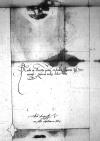List #5723
Sigismund I Jagiellon do Ioannes DANTISCUSCracow (Kraków), 1545-08-22
| odebrano Heilsberg (Lidzbark Warmiński), 1545-08-31 Rękopiśmienne podstawy źródłowe:
| ||||
Tekst + aparat krytyczny + komentarzZwykły tekstTekst + komentarzTekst + aparat krytyczny
Reverendo in Christo Patri et Domino
Reverende in Christo Pater et Domine, sincere nobis dilecte.
Quae proposuit coram nobis nuntius Paternitatis Vestrae
et venerabilis capituli eius, sane intelleximus. Visum est nobis amplius deliberare. Interea mittimus Paternitati Vestrae, quam in
Quae bene valeat.
Datae

